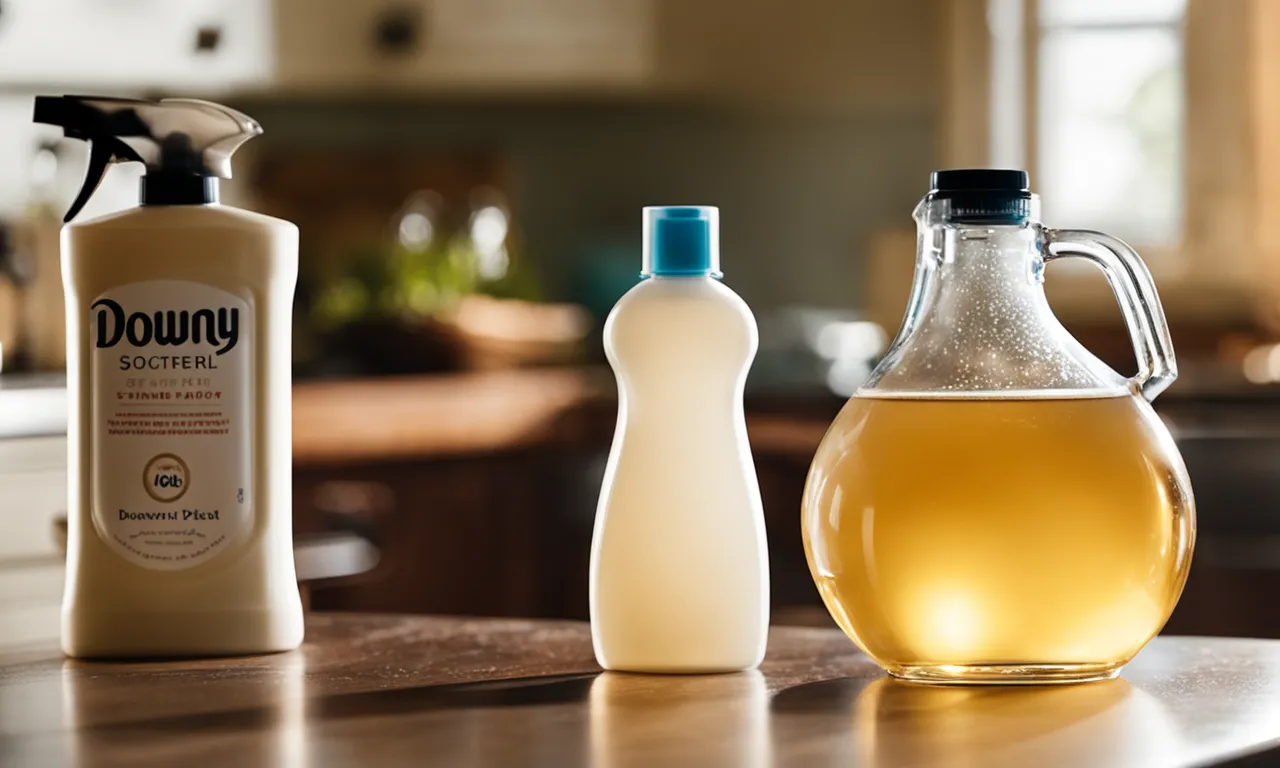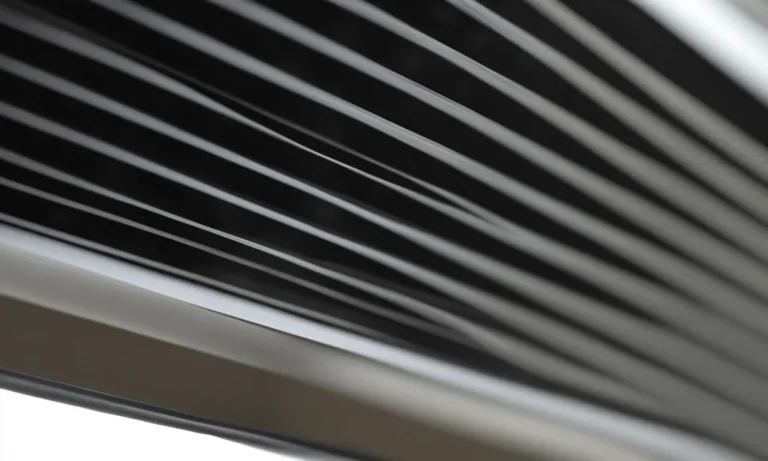Is Downy Fabric Softener Toxic?
Downy fabric softener has been a household staple for decades, infusing clothes with a fresh, clean scent while also softening fabrics. But there has been some debate around whether the ingredients in Downy and other fabric softeners may be toxic or harmful.
If you’re short on time, here’s a quick answer to your question: While small or occasional exposure to Downy is unlikely to cause major health issues, some ingredients like phthalates and ethanol may be irritants for people with sensitivities. Overall toxicity depends on the specific formulation.
In this comprehensive guide, we’ll take an in-depth look at the ingredients in Downy, examine any scientific research on potential toxicity, and provide tips for safer use.
Downy Fabric Softener Ingredients
When it comes to fabric softeners, one of the most popular brands on the market is Downy. However, many people have concerns about the safety of using fabric softeners and wonder if Downy contains any toxic ingredients.
Let’s take a closer look at the ingredients in Downy fabric softener to get a better understanding.
Perfumes
One of the main ingredients in Downy fabric softener is perfumes. These perfumes are responsible for giving your clothes that fresh and pleasant scent that many people love. However, some individuals may have sensitivities or allergies to certain fragrances.
If you find that you are experiencing any adverse reactions to the scent of Downy fabric softener, it is recommended to discontinue use and consult with a healthcare professional.
Ethanol
Another ingredient commonly found in Downy fabric softener is ethanol. Ethanol is a type of alcohol that helps to soften and smooth the fibers in your clothes. While ethanol is generally safe to use, it is important to follow the instructions on the bottle and avoid ingesting or inhaling large amounts of the product.
If accidentally swallowed or inhaled, seek medical attention immediately.
Quaternary Ammonium Compounds
Quaternary ammonium compounds, also known as “quats,” are antimicrobial agents that are often used in fabric softeners to help reduce static cling and soften fabrics. These compounds have been extensively studied and deemed safe for use in household products when used as directed.
However, some individuals may be sensitive to quats and may experience skin irritation. If you have sensitive skin, it is advisable to test a small amount of the fabric softener on a discreet area of your clothing before use.
Phthalates
Phthalates are a group of chemicals that are sometimes used in fragrances and other household products to enhance scent and improve product performance. However, concerns have been raised regarding the potential health risks associated with exposure to phthalates.
While the use of phthalates in personal care products is regulated, some studies suggest that long-term exposure to high levels of phthalates may have adverse effects on human health. It is important to note that Downy has made efforts to reduce or eliminate the use of phthalates in their products, but it is always a good idea to read the label and make an informed decision based on your own personal preferences and concerns.
Potential Health Concerns of Downy Ingredients
Skin Irritation
One potential health concern associated with the use of Downy fabric softener is skin irritation. Some individuals may experience redness, itching, or a rash after coming into contact with the product. This can be particularly problematic for those with sensitive skin or existing skin conditions.
It is important to note that not everyone will have this reaction, but it is worth considering if you or someone in your household has a history of skin sensitivity.
Respiratory Effects
Another concern related to Downy fabric softener is its potential respiratory effects. Inhalation of the product’s fumes or particles may lead to respiratory irritation, especially for individuals with pre-existing respiratory conditions such as asthma or chronic bronchitis.
It is recommended to use Downy in a well-ventilated area and to avoid prolonged exposure to the product’s scent.
Hormonal Effects
There have been some concerns raised regarding the potential hormonal effects of certain ingredients found in Downy fabric softener. While the product contains chemicals that mimic certain hormones, such as phthalates, the actual impact on human health is still being studied.
Some studies suggest that these chemicals may disrupt the endocrine system and have negative effects on reproductive health. However, more research is needed to fully understand the extent of these potential risks.
It is important to note that the information provided here is based on current knowledge and research. It is always a good idea to stay informed and make educated choices when it comes to the products we use in our daily lives.
If you have specific health concerns or questions, it is recommended to consult with a healthcare professional.
Studies on Downy Toxicity
With concerns about the safety of household products on the rise, many consumers have started questioning the potential toxicity of popular fabric softeners like Downy. It is essential to understand that the safety of any product, including fabric softeners, is determined through rigorous scientific studies and regulatory processes.
Scientific Studies
Several scientific studies have been conducted to evaluate the potential toxicity of Downy fabric softener. These studies have focused on assessing the impact of Downy’s ingredients on human health and the environment.
Researchers have examined the individual components of Downy, such as fragrance compounds and surfactants, to assess their potential health effects.
One study published in the Journal of Environmental Health Perspectives found that some fragrance compounds used in fabric softeners, including those found in Downy, can potentially cause respiratory irritation in susceptible individuals.
However, it is important to note that the study did not specifically focus on Downy and its specific formulation.
Regulatory Processes
In addition to scientific studies, regulatory bodies such as the Environmental Protection Agency (EPA) and the Consumer Product Safety Commission (CPSC) closely monitor and regulate the safety of household products, including fabric softeners.
The EPA regulates the ingredients used in fabric softeners and sets safety limits for their use. Companies like Downy must comply with these regulations to ensure the safety of their products. The CPSC also enforces regulations to ensure that fabric softeners meet safety standards.
Tips for Safer Use of Downy
While Downy fabric softener is generally considered safe to use, it’s always a good idea to take some precautions to ensure your safety and the safety of those around you. Here are some tips for safer use of Downy:
Avoid Direct Skin Contact
When using Downy fabric softener, it is recommended to avoid direct skin contact with the product. This is especially important for individuals with sensitive skin or allergies. If you accidentally get Downy on your skin, wash the area thoroughly with soap and water.
If any irritation occurs, seek medical attention.
Ventilate When Using
One way to minimize exposure to any potential chemicals in Downy fabric softener is to ensure proper ventilation when using the product. Open windows or use fans to promote air circulation in the room where you are using Downy.
This will help reduce the concentration of any fumes that may be released.
Consider Fragrance-Free Options
Downy fabric softener comes in a variety of fragrances, but if you are concerned about potential irritants or sensitivities, consider using fragrance-free options. Fragrances in fabric softeners can sometimes cause allergic reactions or respiratory issues in certain individuals.
Opting for fragrance-free alternatives can help minimize these risks.
Look for Alternative Fabric Softeners
If you are still concerned about the potential toxicity of Downy fabric softener, you may want to explore alternative fabric softeners. There are many eco-friendly and natural options available on the market that are free from harsh chemicals and toxins.
These alternatives can provide the same softening benefits without the worry of potential harm.
Remember, while Downy fabric softener is generally considered safe when used as directed, it’s always a good idea to take precautions and make choices that align with your own personal preferences and concerns.
Conclusion
While the research on Downy fabric softener toxicity is still limited, some ingredients may cause irritation or other effects for sensitive individuals. However, occasional use and proper handling is unlikely to pose major risks for most people.
Those concerned can take precautions like ventilation and exploring plant-based alternatives.







